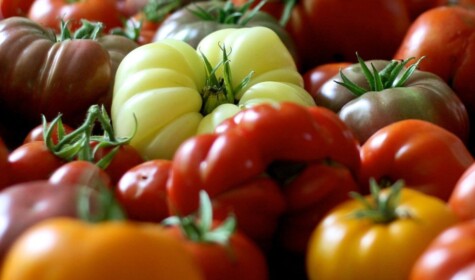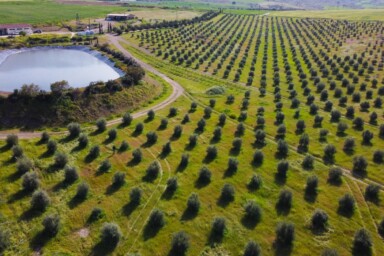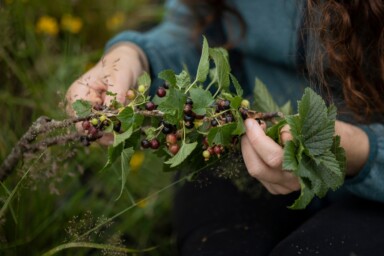COVID-19 has profoundly disrupted our food system and has made the public more aware of its fragility and the need to build greater resiliency into the system, once we begin to emerge out of this crisis. However, COVID-19 is not the only threat on the horizon. We are facing a climate crisis that is causing extreme weather events to happen with greater frequency. This creates significant problems for farmers. Rising temperatures, salinisation of the soil and reduced rainfall (all of which are associated with climate change) can have a significant impact on yield. As we face this climate crisis, we need to grow crops that are able to adapt to the changing climate. This will require plant breeders to focus on increasing resilience in our crop varieties.
Focusing on resilience in plants would be a significant adjustment for the vast majority of farmers. In the years that followed WWII, the priority was to deliver food security and avoid a devastating famine. The Green Revolution applied an industrial and scientific lens to agriculture with the sole goal of increasing productivity. In the years that followed, the use of agrochemicals became routine. Between 1970 and 1990, fertiliser applications increased by 360%while pesticide use grew by 7-8% per year. Plant breeding was also a tool of industrialisation. The agronomist, Norman Borlaug, called the ‘father of the Green Revolution’, won a Nobel Peace Prize for breeding higher yielding wheat varieties. And the focus on yield continues today.
From a micro-economic perspective, the focus on yield makes sense. Market forces encourage plant breeders to develop better yielding varieties. Since the creation of any new variety is complex, costly and time-consuming, there needs to be a viable product at the end of the process that breeders believe they will be able to sell, in order to justify the time and expense. However, as the years have passed this approach to plant breeding has taken us further and further down a path towards homogenisation. The drive to constantly increase yields has led to the marginalisation of other characteristics and loss of varietials. Breeders now primarily seek to produce seeds that create a crop with consistent and predictable characteristics as quickly as possible. Driven by the endless push towards more globalised and commercial food systems, another key consideration for breeders is whether the produce can travel well. With food being shipped across the world, it is essential for businesses that it can be transported easily and travel without spoiling.
This focus on increasing yield is at the heart of the argument that GM crops are needed to feed a growing global population. Biotech companies argue that it will be impossible to deliver global food security without new plant breeding techniques, such as CRISPR, which allows for gene-editing. They claim that farmers need to embrace these engineered plants so that no one goes hungry as climate change and global warming take hold, calling these high-tech varietals ‘climate-smart’. This is a false narrative, however. Hunger is inextricably tied to poverty, which is a structural issue that needs to be addressed through political and economic reform. It’s naïve and unrealistic to say that hunger can be solved by new plant breeding techniques. The reality is that we already produce enough food to feed the world, so it is a question of power and of distribution. Until the Global North and the Global South have an equal share in the Earth’s bounty, food insecurity in developing nations will continue.
We need to de-prioritize yield within plant breeding. It has become an obsession and does little to help prepare our farmers for the future. As global temperatures continue to climb and the frequency of extreme weather events increases, our crops need to be bred for resilience so that they can adapt to the changing environment. Genetically identical monocultures are particularly vulnerable to disease (hence the impending demise of the Cavendish banana) and are more likely to be susceptible to stress from climate change. Breeding crops that are better able to adapt and adjust to shifting climates or increased pressures will mean that our entire food system will be better able to survive and recover when hit by future crises.
To achieve this increased resilience, we need greater diversity in our crop varieties. The biodiversity of our crops is essential in order to protect the wider biodiversity of our planet. We are facing an ecological emergency across the world with an ever increasing rate of extinction. The intrinsic value of our planet’s biodiversity cannot be quantified and maintaining biodiversity in crops benefits farmers. Many landrace varieties have naturally adapted over the generations to survive more challenging environments. However, these varieties have been overlooked and forgotten due to the drive for increased productivity and yield. While landraces may have lower yields, they are better able to cope with extreme weather events. For example, small-scale maize producers in Mexico have cultivated landraces that can cope with higher temperatures. Because they are better able to survive, they provide better overall food security.
These diverse varieties used to be passed down the generations through the practice of seed saving. While there are many dedicated farmers (particularly in indigenous communities) who continue the tradition, seed saving has lost favour since the Green Revolution took hold. This decline is due in part because of the ease by which high-quality seed can be bought. F1 hybridisation became a very popular form of plant breeding. F1 hybrids are created when two different varieties are bred together to produce uniform and vigorous offspring. However, there tends to be an inconsistency of traits in the next generation of F1 seeds since the offspring of F1 hybrids do not consistently display the parental traits in the next generation. However, a key component is that many seed companies now require farmers to purchase new seed each year. Framing it as a question of intellectual property, Monsanto has brought legal action against those farmers who save seed. In addition to seed saving, traditional plant breeding can help to produce efficient varieties without sacrificing diversity and resilience. These traditional breeding methods (such as open pollination) can deliver commercially viable crops, which can help farmers adapt to a changing climate. This type of plant breeding tends to be low-cost and low-tech, and has proven to be faster and more effective than GM, particularly when informed by new technologies like Marker Assisted Selection.
However, plant breeding is only one part of the picture. Resilience is needed across the agricultural system from the field, all the way to the consumer. The work of shifting the system towards a more sustainable future is the key mission of the SFT. The SFT believe that to build a truly resilient food system for future generations, there needs to be a greater shift towards sustainable farming methods, which includes wider use of seeds to maintain diversity. At the farm level, this is based on agroecological practices which engender a greater capacity to recover from extreme weather events, and fosters stronger socio-economic resilience while reducing dependence on external inputs. Agroecology needs to be supported by Governments across the world to ensure that farmers can transition to more sustainable farming practices. This would include supporting a shift in Government research and development funding to ensure that traditional and agroecological plant breeding receives more financial support and resources. As the nation begins to shift its focus to the post-pandemic future, the SFT will continue to ask Government to increase support for sustainable farming and will continue to highlight the importance of seed diversity as a key element to building a more resilient future for the planet.







